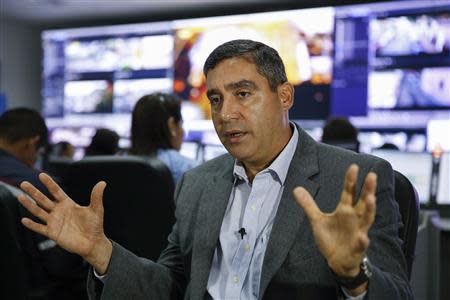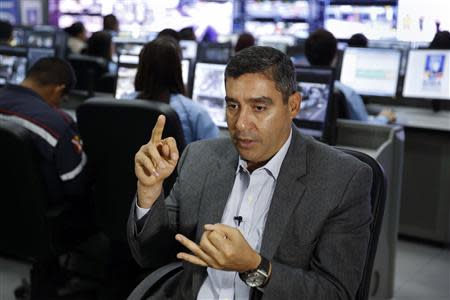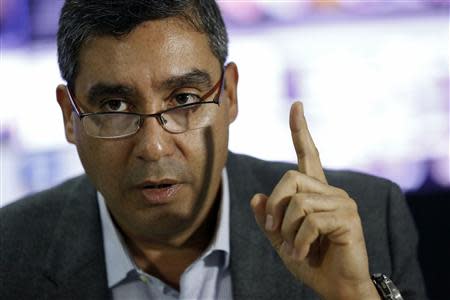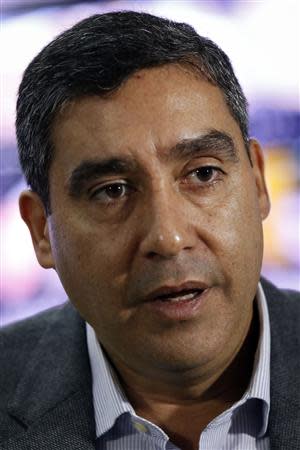Venezuela says murder rate plunges under Maduro
By Andrew Cawthorne and Patricia Velez CARACAS (Reuters) - Venezuela's murder rate has fallen by about a quarter this year, the government says, dismissing opponents' talk of ever-rising crime as propaganda. Violent crime has been Venezuelans' No. 1 concern in recent years. Awash with guns, the South American nation is one of the world's most violent, with an official homicide rate of about 52 per 100,000 people last year, or more than 15,000 victims. After taking over from late socialist leader Hugo Chavez in April, President Nicolas Maduro declared the war on crime his priority. The former bus driver sent soldiers onto the streets as part of his "Safe Fatherland Plan," among other measures. Interior Minister Miguel Rodriguez Torres, who also heads Venezuela's intelligence service, told Reuters that there had been an immediate impact, with the murder rate likely to end 2013 at a much-improved 39 per 100,000 inhabitants. "That doesn't mean we're happy," the 49-year-old army major-general said at a flashy new surveillance and rapid-response center on Wednesday. "There's still a lot of work to do, but we're heading firmly in the right direction," added Rodriguez, who does not speak often with foreign media. Yet the Venezuelan Violence Observatory says its estimate is at least 73 homicides per 100,000 people last year - or more than 21,000 murders. The local watchdog has projected a 24 percent rise in 2013. That, Rodriguez said, is due to both inaccurate counting of corpses in morgues where many have died of natural causes and deliberate misinformation spread by pro-opposition local media. "What are they trying to achieve with this?" he asked against a backdrop of surveillance monitors maintained by Chinese technicians as part of a $1 billion national program to install 30,000 new cameras. "They want to keep the perception worse than the reality." The projected 2013 figure that Rodriguez gave would be the lowest level for about four years, he said. But it would still leave Venezuela with one of the worst murder rates in the world, behind fellow Latin America and Caribbean nations Honduras, El Salvador, Belize and Jamaica, according to United Nations data. While locals have long listed violent crime as their main concern, foreign visitors also are often spooked by their governments' dire travel warnings about Venezuela. Police often commit crimes, including so-called express kidnappings that are a common tactic for quick extortion. Rodriguez said kidnappings were down 51 percent this year, without giving overall figures. "MAGNICIDE" During eight months in power, Maduro has garnered headlines worldwide and drawn mockery from opponents with frequent accusations of assassination plots targeting him and the ruling Socialist Party's second in command, Diosdado Cabello. Critics say such accusations are a smokescreen to distract Venezuelans from crime, inflation and other grassroots problems. But Rodriguez said he had personally seen details and interviewed witnesses proving that there was a real "magnicide" plot ordered by right-wingers in Miami, Costa Rica and Colombia. Two Colombian mercenaries were arrested in possession of assault rifles in Los Teques, near Caracas, he said, after being dispatched to Venezuela soon after Maduro's inauguration. They have both been convicted, authorities say. "They admitted they came to kill someone, and they had photos of Maduro and Diosdado," he said, adding that a second plot from Colombia had been detected and was being monitored. Rodriguez was a close friend of Chavez from his 1992 coup attempt to his death from cancer in March. As longtime intelligence head, he said he had been involved in thwarting two of several plots against Chavez during his 14-year rule. In a famous case from 2004, he said 150 Colombian mercenaries infiltrated Venezuela with a plan first to bomb Chavez from planes during a broadcast of his "Hello, President" TV program, then to storm the Miraflores presidential palace. The captured leader of the group "told me to my face that he personally was going to cut off the president's head and smoke a Cuban cigar sitting at his desk," Rodriguez said. Opponents of Chavez and Maduro have long scoffed at such accusations, saying evidence is scant and that the government is inventing or inflating cases to justify its autocratic style. In a two-hour interview, Rodriguez spoke warmly of his long association with Chavez. "He was like a father to me," he said. The pair met when Rodriguez was a young cadet and Chavez an army captain 10 years his senior. They were in jail together after the failed 1992 coup and were fellow anti-government conspirators until Chavez won power in 1998. "Once after we left prison, around 1996, we met secretly in the sand dunes at Coro," Rodriguez recalled with a smile. "He was dressed in a wig and dark glasses!" (Additional reporting by Daniel Wallis and Eyanir Chinea; Editing by Daniel Wallis and Lisa Von Ahn)




